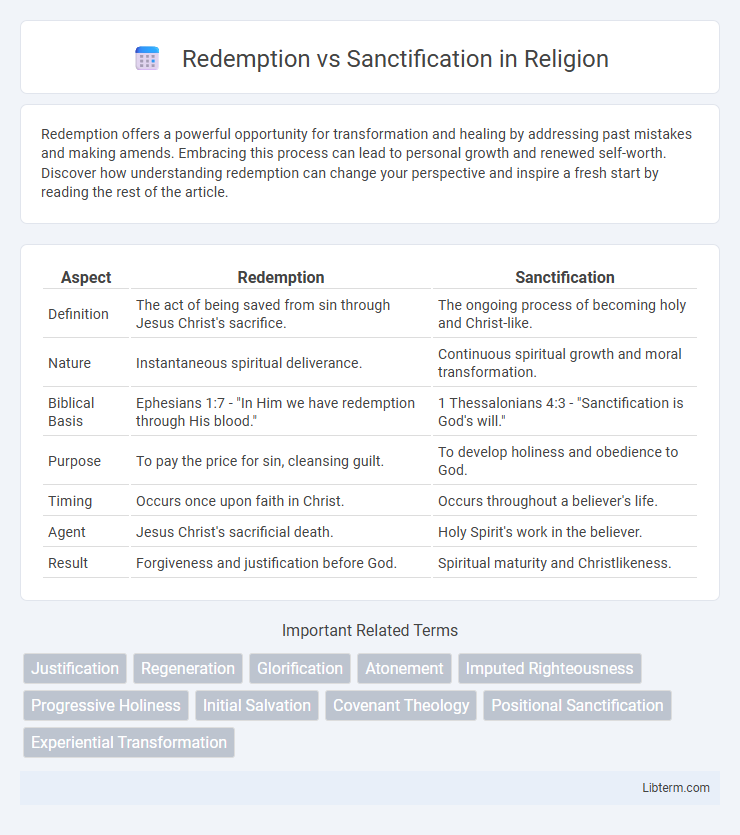Redemption offers a powerful opportunity for transformation and healing by addressing past mistakes and making amends. Embracing this process can lead to personal growth and renewed self-worth. Discover how understanding redemption can change your perspective and inspire a fresh start by reading the rest of the article.
Table of Comparison
| Aspect | Redemption | Sanctification |
|---|---|---|
| Definition | The act of being saved from sin through Jesus Christ's sacrifice. | The ongoing process of becoming holy and Christ-like. |
| Nature | Instantaneous spiritual deliverance. | Continuous spiritual growth and moral transformation. |
| Biblical Basis | Ephesians 1:7 - "In Him we have redemption through His blood." | 1 Thessalonians 4:3 - "Sanctification is God's will." |
| Purpose | To pay the price for sin, cleansing guilt. | To develop holiness and obedience to God. |
| Timing | Occurs once upon faith in Christ. | Occurs throughout a believer's life. |
| Agent | Jesus Christ's sacrificial death. | Holy Spirit's work in the believer. |
| Result | Forgiveness and justification before God. | Spiritual maturity and Christlikeness. |
Understanding Redemption: Definition and Significance
Redemption refers to the act of being saved from sin through the sacrifice of Jesus Christ, signifying freedom from the bondage of guilt and spiritual death. It is foundational in Christian theology as it marks the believer's initiation into a restored relationship with God by paying the price for sin. Understanding redemption highlights its significance as the essential first step in the salvation process, enabling sanctification, which is the ongoing process of spiritual growth and purification.
The Meaning of Sanctification in Christian Theology
Sanctification in Christian theology refers to the process by which believers are progressively made holy through the work of the Holy Spirit, distinguishing it from redemption, which is the initial act of being saved from sin through Christ's sacrifice. This transformative journey involves growing in grace, obedience, and Christlikeness, aligning one's life with God's will as revealed in Scripture. Sanctification is both a positional reality, given at salvation, and a progressive experience, requiring continual surrender and reliance on God's power.
Redemption vs Sanctification: Key Differences
Redemption refers to the act of being saved or delivered from sin through the sacrifice of Jesus Christ, emphasizing the forgiveness of sins and restoration of a believer's relationship with God. Sanctification is the ongoing process of becoming holy and conforming to the image of Christ through the work of the Holy Spirit, involving spiritual growth and moral transformation. The key difference lies in redemption as a one-time event securing salvation, while sanctification is a continuous journey of spiritual development after redemption.
The Biblical Foundations of Redemption
Redemption in the Bible is fundamentally anchored in God's act of delivering humanity from sin through the sacrificial death and resurrection of Jesus Christ, as seen in verses like Ephesians 1:7 and Colossians 1:14. It emphasizes liberation from the penalty and power of sin, achieved by the payment of a ransom, a concept deeply rooted in Old Testament themes such as the Exodus and the Passover lamb (Exodus 12). Sanctification, while related, refers to the ongoing process of being made holy and conformed to the image of Christ, distinct from the initial redemptive act that secures salvation.
Scriptural Insights on Sanctification
Sanctification in Scripture is portrayed as an ongoing process of being made holy through the work of the Holy Spirit, distinct from redemption, which is the initial act of being saved from sin (1 Thessalonians 4:3). Key passages such as John 17:17 emphasize sanctification through truth, underscoring the transformational role of God's Word. Romans 6:19-22 reveals sanctification as a daily commitment to righteousness, reflecting a believer's progressive growth in grace and holiness.
The Role of Faith in Redemption and Sanctification
Faith serves as the foundational means by which individuals receive redemption, enabling the forgiveness of sins through belief in Jesus Christ's sacrificial atonement. In sanctification, faith operates as the ongoing trust and reliance on God's grace, empowering believers to grow in holiness and spiritual maturity. Both redemption and sanctification are deeply intertwined processes where faith activates salvation and sustains transformative growth in the Christian life.
Redemption as a One-Time Act
Redemption is a one-time, decisive act in Christian theology where believers are freed from the penalty of sin through the sacrificial death of Jesus Christ. This singular event secures eternal salvation by paying the full price for sin, contrasting with sanctification, which is the ongoing process of spiritual growth and moral transformation. Redemption establishes the believer's justified status before God, providing the foundation for continual sanctification in their daily lives.
Sanctification as an Ongoing Process
Sanctification is an ongoing process wherein believers are progressively transformed to reflect the character of Christ through daily spiritual growth and obedience. Unlike redemption, which is a one-time act of being saved from sin's penalty, sanctification involves continuous renewal by the Holy Spirit and active participation in prayer, scripture study, and moral living. This lifelong journey fosters holiness and maturity, distinguishing it as an essential aspect of Christian discipleship.
The Relationship Between Redemption and Sanctification
Redemption is the initial act of being saved from sin through Christ's sacrifice, providing believers with forgiveness and new life. Sanctification is the ongoing process of spiritual growth and moral transformation that follows redemption, where believers become more like Christ in character and conduct. The relationship between redemption and sanctification is foundational, as redemption secures the believer's justification, while sanctification embodies the active pursuit of holiness and obedience in everyday life.
Practical Implications for Believers Today
Redemption secures believers' forgiveness and freedom from sin's penalty, providing a foundational identity in Christ that transforms their spiritual status. Sanctification involves the ongoing process of spiritual growth and moral transformation, enabling believers to live out their faith through practical obedience and Christlike character. Together, redemption and sanctification empower believers to experience not only salvation but also a daily renewal that impacts their decisions, relationships, and witness in the world.
Redemption Infographic

 libterm.com
libterm.com